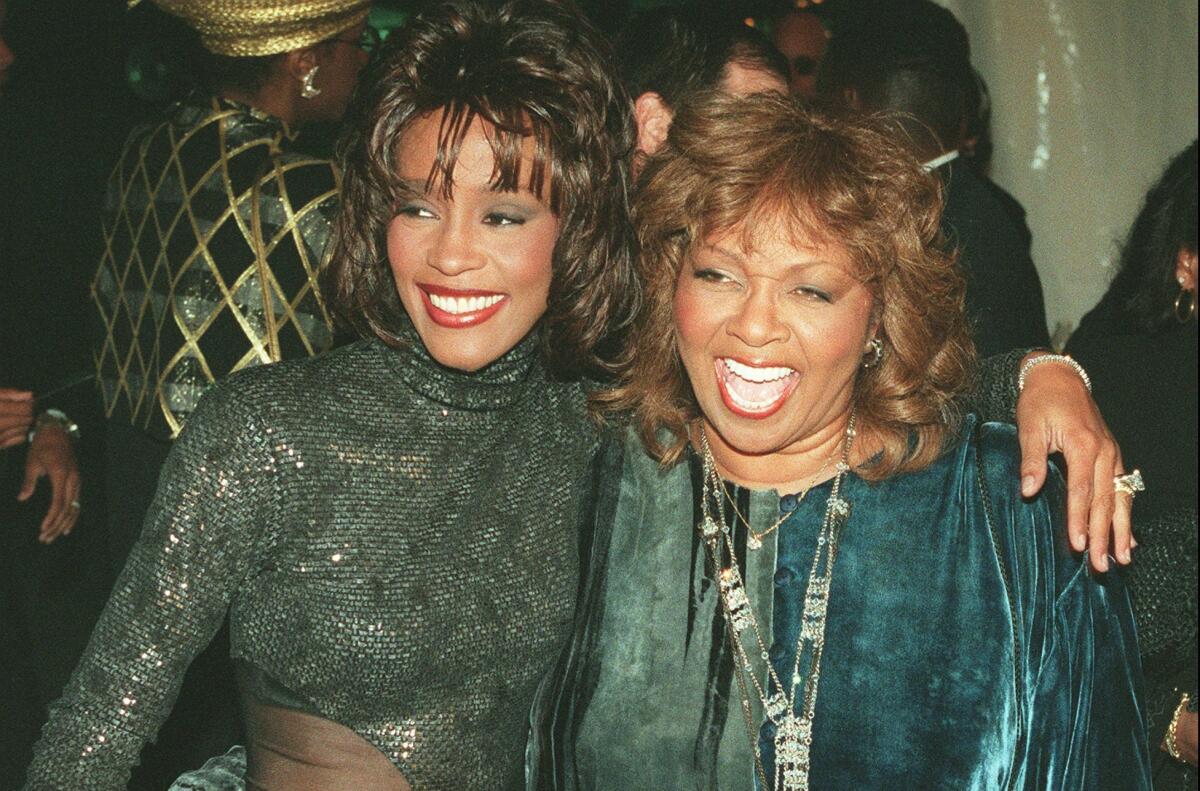Whitney Houston’s mother remembers her daughter in new memoir

- Share via
By the time Whitney Houston died in a bathtub at the Beverly Hilton Hotel last February, tracking her deterioration had become a blood sport for the gossip rags.
Her struggles with substance abuse had been the subject of speculation for years, fodder for tawdry headlines and jokes spawned by the singer’s infamous declaration in 2002 that “crack is whack.” Her death at age 48 on the weekend of the Grammy Awards was declared the result of drowning and the “effects of atherosclerotic heart disease and cocaine use.”
Cissy Houston, the performer’s mother, has chosen the first anniversary of her death to publish a memoir, “Remembering Whitney” (HarperCollins: 320 pp., $27.99).
It’s her attempt to strip away the sleazy hearsay and provide a more loving look at the fallen superstar, whose music and movie career disintegrated as she lost herself in substance abuse and her tumultuous marriage to R&B; singer Bobby Brown.
Subtitled “My Story Of Love, Loss and the Night the Music Stopped,” the book opens with that heartbreaking day in February. Cissy writes that Nippy -- as her family called Whitney -- seemed to be on an upswing before her death, but exuded sadness when they talked before the Grammys.
“Nippy never liked to share her problems with me, so I didn’t know exactly what was wrong,” she writes.
This evasiveness runs throughout the book, ultimately proving to be a crippling flaw for mother and daughter.
Whitney’s path to superstardom is well-documented but Cissy, herself a well-regarded gospel vocalist and backup singer, sweetly traces her own upbringing and those early days of helping Nippy hone her talents in church, taking her along to do session work and watching her morph into America’s sweetheart under the careful tutelage of music impresario Clive Davis.
But as Whitney’s career began to soar, with millions of records sold, so did her addiction.
Fans who fell in love with the wholesome Whitney of “The Greatest Love of All” and “The Bodyguard” may be surprised by some anecdotes in the book that suggest she began to buckle under the pressures of success early on, and even considered walking away from her career multiple times to live away from the public that adored -- and scrutinized -- her, at one point saying, “You know, I never asked for this madness. I couldn’t have imagined it.”
Yet her descent into substance abuse is presented rather gently here, with no major bombshells or deep analysis.
Cissy Houston does reveal that Brown did not introduce her daughter to drugs, contrary to popular belief. Suggesting that Whitney’s drug use began early in her career, Cissy recalls a conversation in the late 1980s with Robyn Crawford, Whitney’s closest friend and former assistant, who said if drugs were around, “Nippy would keep on doing it until everything was gone,” in Cissy’s words.
As for those longtime rumors of a romance with Crawford (denied by both Whitney and Crawford), Cissy writes that she knew nothing about a romantic relationship, but “I just didn’t want her with my daughter.”
Cissy admits with palpable guilt that it took her a while to become privy to Whitney’s “partying” and confides: “The truth is, back then I didn’t really want to know about it.”
A great deal of the book is dedicated to the relationship between mother and daughter, one that grew more fraught as the drug use worsened. Cissy writes that Whitney was stubborn, refusing to acknowledge her problems and alienating her mother, who notes that she often intentionally overlooked things out of fear of being further shut out.
“I’m not addicted,” Whitney would claim, though she was plainly “just as high as she could be.” “I’m a grown woman. I can take care of myself.”
Motherly pleas were brushed off: “Oh Mommy, you don’t need to worry about any of that” was a recurring phrase until the end.
Whitney was never able to make the connection between career setbacks and escalating drug use, Cissy writes, and attempts at intervention weren’t successful. One came after a rough patch that included being caught with marijuana (the only drug actually mentioned by name in the book) at a Hawaii airport and being fired from a performance at the Academy Awards by music director and longtime friend Burt Bacharach.
Stories of canceled concerts, haggard appearance, erratic behavior, an ill-advised reality TV show with Brown, fluctuations in weight and poor performances became an increasing part of the star’s narrative and chipped away at the voice and stunning image. Cissy details a few more trips to rehab, including a court-ordered stay she initiated. But in the end Whitney lost to her demons.
“Remembering Whitney” doesn’t scratch all that deeply at the star’s addictions, and that might frustrate readers hoping for more insight. Nor does it attempt to present a full portrait of a performer’s personal life. This is a book about a mother grappling with the loss of her child, still wondering if it could have been avoided had her daughter walked away from the pressures of fame or, more heartbreakingly, if she could have averted the disaster.
“Should I have done things differently? Was I a good mother? Was I too hard on her,” she asks in the book’s somber epilogue. “And the worst one of all -- Could I have saved her somehow?”
ALSO:
‘Black Against Empire’ tells the history of Black Panthers
In ‘Unknown Pleasures’,’ Peter Hook riffs on Joy Division
The fate of Timbuktu manuscripts uncertain as Mali library burns
More to Read
Sign up for our Book Club newsletter
Get the latest news, events and more from the Los Angeles Times Book Club, and help us get L.A. reading and talking.
You may occasionally receive promotional content from the Los Angeles Times.







